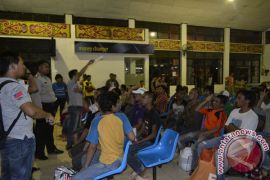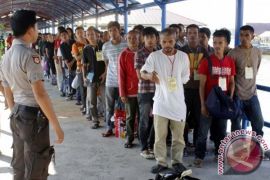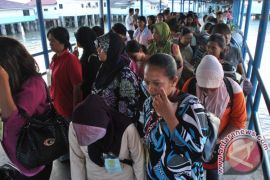Taiwan`s news agency CNA recently reported that under the amended law, foreign domestic helpers, caregivers and fishing boat workers will all have their service period in the country extended from nine to 12 years.
The amendment, approved after being proposed by the ruling Kuomintang`s (KMT) legislative caucus, drew criticism from opposition Democratic Progressive Party lawmaker Huang Sue-ying who claimed that KMT President Ma Ying-jeou had allowed it for the benefit of his supporters in the business world, CNA reported.
President Ma Ying-jeou was reelected to a second four-year term in office in general elections on January 14, 2012.
Indonesian migrant workers in Taiwan are the third biggest contributor of remittances to Indonesia after those in Saudi Arabia and Malaysia. They account for 45 percent of the entire foreign migrant workers community in Taiwan with the rest consisting of workers from Malaysia, the Philippines, Vietnam and Thailand.
On January 24,2001, Taiwan and Indonesia signed an MoU on manpower placement and this resulted in an increasing number of Indonesian migrant workers going to Taiwan.
By August 2011, some 168,000 Indonesian migrant workers were working in Taiwan making Indonesia the biggest manpower supplier to Taiwan among Southeast Asian countries.
Within two years, the number of Indonesian migrant workers increased by 35 thousand from 140,000 in 2009 to 175,000 in 2011.
Approximately 45 percent of migrant workers in Taiwan are Indonesian and some of them work as fishermen.
Taiwan`s Economic and Trade Representative in Indonesia, Andrew Hsia, said Indonesian migrant workers in Taiwan are divided in two categories, namely caregivers and fishermen.
Most of the caregivers were very happy with the way they are treated, enjoying Taiwanese minimum wages, covered by national health insurance so they can see doctors free of charge, and have a very good working time so they can spend time with their families, said Hsia.
As for Indonesians who work as fishing boat crews, they were also given attention by the Taiwanese government.
Hsia said the government of Taiwan is looking forward to discussing the matter with the Indonesian Maritime and Fisheries Ministry to sign an agreement for protection of Indonesian fishing crew members who are working on Taiwanese fishing boats.
"This MoU is important to provide proper training, regular employment channels which can lead to lower wages due to improper legal documents. Then the protection would be better," he said.
Improving ties
The presence of Indonesian workers in Taiwan was an indicator of the improving relations between the biggest archipelagic country in the world and Formosa island.
In its relations with Taiwan, Indonesia which has adopted the "one-China" policy is focusing on the economic field, including the investment sector.
Taiwan has so far been sending people to Indonesia among others as investors.
Hsia also said that he and the Taipei Economic and Trade Office (TETO) in Indonesia would like to encourage the Taiwanese government to pay more attention to Indonesia.
"To Southeast Asia in general, to Indonesia in particular I think there`s no reason why we cannot work together closer, our economies are complementary to each other," Hsia said.
"Indonesia has the resources, a big market while Taiwan has the technology, so why not work together for the benefit of both of our countries and peoples," he said.
Meanwhile, secretary general of the Council of the Economic Planning and Development (CEPD), Taiwan, Shien Quey Kao told ANTARA in Taipei recently, Taiwan was continuing to encourage its businesspeople to invest in Indonesia as the economic power has been moving from the West to the East including to Indonesia.
"Since the financial crisis in the world, the economic power has been moving from the West to the East. This has prompted Taiwan to set its sights more on Asian countries, including Indonesia, where investment is concerned" she said.
Indonesia will be a special choice for Taiwanese investment as the former with its population of more than 240 million is a very big market for Taiwan`s export products, she said, adding that Indonesian workers` wages were relatively lower than those in China which is also one of Taiwan`s investment destinations.
In its efforts to enhance its relations and economic cooperation with Indonesia, Taiwan will keep on working hard in the face of several challenges, including diplomatic matters and tight competition, especially with China and South Korea, she said.
In addition, Taiwan which has good industrial networks in Asia including Indonesia has also set up a task force in its government besides making coordination with relevant institutions, Shien said.
Based on available data, Indonesian exports to Taiwan had also shown an improvement since 2009 valued at USD 5.183 billion which increased to USD 6.020 billion in 2010 reaching USD4.350 billion by July 2011.
Meanwhile, Taiwan`s exports to Indonesia also improved from USD 3.226 billion in 2009 to USD 4.510 billion in 2010 and by July 2011 the figure had reached USD 3.041 billion.
The total trade value between Indonesia and Taiwan also increased from USD 8.410 billion in 2009 to USD 10.53 billion in 2010, and by July 2011 it was recorded at USD 7.390 billion.
According to the data from the Indonesian investment coordinating board (BKPM), by March 2011, Taiwan`s total investment had reached USD 14.046 billion.
For 2011, Taiwan`s investment amounted to USD 5.11 million, the figure has shown an increase by 120 percent compared to the same period in the previous year of 2010.
Taiwan is also considered to be Indonesia`s number 9 foreign direct investment source creating jobs for about one million people across Indonesia.
Taiwanese companies now operating in Indonesia are Pao-chen Shoes Co., ACER, Bank Chinatrust, President Food, PT. Indo Tai-Chen Textile, Evergreen Group and Na Ya Plastic Corp.
(T.B005/HAJM/H-YH)
Reporter: by Bambang Purwanto
Editor: Priyambodo RH
Copyright © ANTARA 2012








